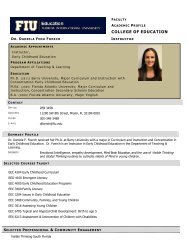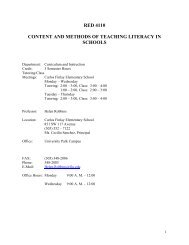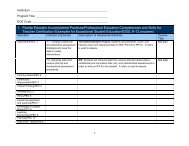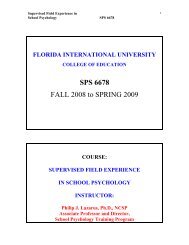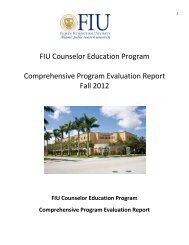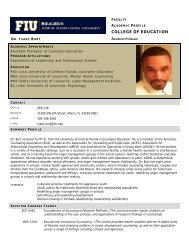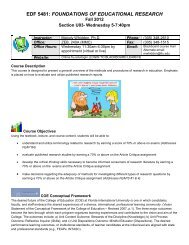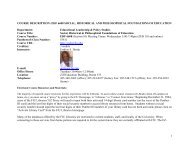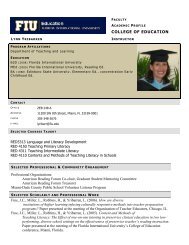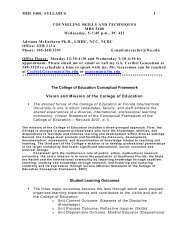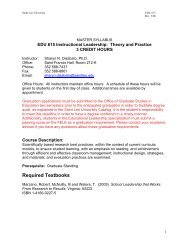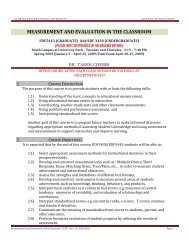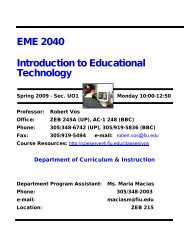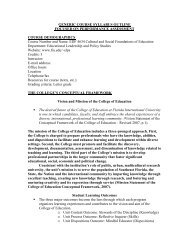2007 - College of Education - Florida International University
2007 - College of Education - Florida International University
2007 - College of Education - Florida International University
You also want an ePaper? Increase the reach of your titles
YUMPU automatically turns print PDFs into web optimized ePapers that Google loves.
High School Influences on the Selection <strong>of</strong> Athletic Training as a Career<br />
Denisha S. Fergusson, Jennifer L. Doherty-Restrepo, Michelle L. Odai<br />
<strong>Florida</strong> <strong>International</strong> <strong>University</strong>, Miami, FL<br />
Context: Research suggests internships, mentorship, and specialized school programs<br />
positively influence career selection; however, little data exists specific to athletic<br />
training. Objective: We identified high school (HS) experiences influencing career<br />
choice in college athletic training students (ATS). Design: Our survey included 35<br />
Likert-type close-ended questions, which were reviewed by a panel <strong>of</strong> faculty and peers<br />
to establish content and construct validity. Setting: Participants completed an online<br />
questionnaire at their convenience. Participants: 217 college ATS (153 female, 64<br />
male) from a random selection <strong>of</strong> accredited programs on the east coast. We excluded<br />
minors, freshmen, and undecided majors from the study. Informed consent was implied<br />
by proceeding to the questionnaire. Data Collection and Analysis: We used descriptive<br />
statistics to analyze the data collected via a secure website. Results: Mentors were most<br />
influential in the decision <strong>of</strong> career path (62.4%;n=131/210) with 85.2% (n=138/162)<br />
reporting mentors were readily available to answer questions regarding career options<br />
and 53.1% (n=86/162) counseled them regarding HS electives. Of participants involved<br />
in an internship (41.0%;n=86/210), most developed such opportunities independently<br />
(66.3%;n=57/86). Respondents who attended traditional HS suggested providing diverse<br />
electives (71.9%;n=133/185), additional internship (53.5%;n=99/185), and mentorship<br />
(33.0%;n=61/185) opportunities to effectively educate students regarding career options.<br />
Conclusions: <strong>College</strong> ATS that gained internship experience during HS report the<br />
opportunity positively influenced their career selection. Mentors support HS students by<br />
<strong>of</strong>fering insight and expertise in guiding students’ career choices. Participants suggested<br />
HS afford diverse electives with internship and mentorship opportunities to positively<br />
influence interested students towards pursuing a career in athletic training. Key Words:<br />
career choice, education, mentorship<br />
Allied health pr<strong>of</strong>essions constantly strive to improve recruitment efforts to increase the<br />
number <strong>of</strong> students enrolling in allied health pr<strong>of</strong>ession education programs. 1 One proposed way<br />
to positively impact the shortage <strong>of</strong> allied health pr<strong>of</strong>essionals is to effectively promote health<br />
careers to high school students. 2 Research suggests high school students have poor knowledge<br />
<strong>of</strong> health care pr<strong>of</strong>essions and the opportunities available to them. 1 Some methods <strong>of</strong> increasing<br />
student awareness <strong>of</strong> allied health pr<strong>of</strong>essions include brochures, college and career fairs, school<br />
programs, mentorship, internship opportunities, magazines, and the media. 1-3 Promotional<br />
efforts <strong>of</strong> interest in this investigation are mentorship, internships, and specialized school<br />
programs (SSP).<br />
A 2001 study distributed questionnaires to high school career counselors to identify<br />
perceived effective promotional activities. 2 The most effective efforts include health career days,<br />
visits by local practicing health pr<strong>of</strong>essionals, and health career site visits. 2 These efforts can be<br />
categorized as interactions with health care pr<strong>of</strong>essionals and depending on the level <strong>of</strong><br />
interaction, a form <strong>of</strong> mentorship. 2<br />
Mentorship is a key component <strong>of</strong> informing and educating high school students on<br />
career options. 3 Mentors in the health pr<strong>of</strong>ession are a support system by providing insight,



